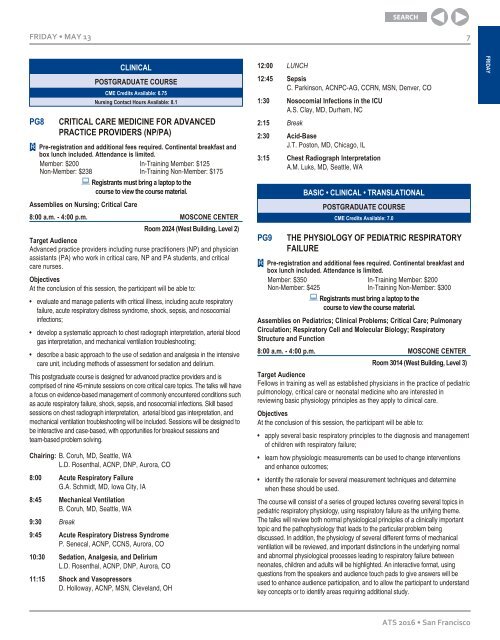Final Program
h6okmgq
h6okmgq
You also want an ePaper? Increase the reach of your titles
YUMPU automatically turns print PDFs into web optimized ePapers that Google loves.
FRIDAY • MAY 13 7<br />
PG8<br />
CLINICAL<br />
POSTGRADUATE COURSE<br />
CME Credits Available: 6.75<br />
Nursing Contact Hours Available: 8.1<br />
CRITICAL CARE MEDICINE FOR ADVANCED<br />
PRACTICE PROVIDERS (NP/PA)<br />
Pre-registration and additional fees required. Continental breakfast and<br />
box lunch included. Attendance is limited.<br />
Member: $200 In-Training Member: $125<br />
Non-Member: $238 In-Training Non-Member: $175<br />
Registrants must bring a laptop to the<br />
course to view the course material.<br />
Assemblies on Nursing; Critical Care<br />
8:00 a.m. - 4:00 p.m. MOSCONE CENTER<br />
Room 2024 (West Building, Level 2)<br />
Target Audience<br />
Advanced practice providers including nurse practitioners (NP) and physician<br />
assistants (PA) who work in critical care, NP and PA students, and critical<br />
care nurses.<br />
Objectives<br />
At the conclusion of this session, the participant will be able to:<br />
• evaluate and manage patients with critical illness, including acute respiratory<br />
failure, acute respiratory distress syndrome, shock, sepsis, and nosocomial<br />
infections;<br />
• develop a systematic approach to chest radiograph interpretation, arterial blood<br />
gas interpretation, and mechanical ventilation troubleshooting;<br />
• describe a basic approach to the use of sedation and analgesia in the intensive<br />
care unit, including methods of assessment for sedation and delirium.<br />
This postgraduate course is designed for advanced practice providers and is<br />
comprised of nine 45-minute sessions on core critical care topics. The talks will have<br />
a focus on evidence-based management of commonly encountered conditions such<br />
as acute respiratory failure, shock, sepsis, and nosocomial infections. Skill based<br />
sessions on chest radiograph interpretation, arterial blood gas interpretation, and<br />
mechanical ventilation troubleshooting will be included. Sessions will be designed to<br />
be interactive and case-based, with opportunities for breakout sessions and<br />
team-based problem solving.<br />
Chairing: B. Coruh, MD, Seattle, WA<br />
L.D. Rosenthal, ACNP, DNP, Aurora, CO<br />
8:00 Acute Respiratory Failure<br />
G.A. Schmidt, MD, Iowa City, IA<br />
8:45 Mechanical Ventilation<br />
B. Coruh, MD, Seattle, WA<br />
9:30 Break<br />
9:45 Acute Respiratory Distress Syndrome<br />
P. Senecal, ACNP, CCNS, Aurora, CO<br />
10:30 Sedation, Analgesia, and Delirium<br />
L.D. Rosenthal, ACNP, DNP, Aurora, CO<br />
11:15 Shock and Vasopressors<br />
D. Holloway, ACNP, MSN, Cleveland, OH<br />
12:00 LUNCH<br />
12:45 Sepsis<br />
C. Parkinson, ACNPC-AG, CCRN, MSN, Denver, CO<br />
1:30 Nosocomial Infections in the ICU<br />
A.S. Clay, MD, Durham, NC<br />
2:15 Break<br />
2:30 Acid-Base<br />
J.T. Poston, MD, Chicago, IL<br />
3:15 Chest Radiograph Interpretation<br />
A.M. Luks, MD, Seattle, WA<br />
PG9<br />
BASIC • CLINICAL • TRANSLATIONAL<br />
POSTGRADUATE COURSE<br />
CME Credits Available: 7.0<br />
THE PHYSIOLOGY OF PEDIATRIC RESPIRATORY<br />
FAILURE<br />
Pre-registration and additional fees required. Continental breakfast and<br />
box lunch included. Attendance is limited.<br />
Member: $350 In-Training Member: $200<br />
Non-Member: $425 In-Training Non-Member: $300<br />
Registrants must bring a laptop to the<br />
course to view the course material.<br />
Assemblies on Pediatrics; Clinical Problems; Critical Care; Pulmonary<br />
Circulation; Respiratory Cell and Molecular Biology; Respiratory<br />
Structure and Function<br />
8:00 a.m. - 4:00 p.m. MOSCONE CENTER<br />
Room 3014 (West Building, Level 3)<br />
Target Audience<br />
Fellows in training as well as established physicians in the practice of pediatric<br />
pulmonology, critical care or neonatal medicine who are interested in<br />
reviewing basic physiology principles as they apply to clinical care.<br />
Objectives<br />
At the conclusion of this session, the participant will be able to:<br />
• apply several basic respiratory principles to the diagnosis and management<br />
of children with respiratory failure;<br />
• learn how physiologic measurements can be used to change interventions<br />
and enhance outcomes;<br />
• identify the rationale for several measurement techniques and determine<br />
when these should be used.<br />
The course will consist of a series of grouped lectures covering several topics in<br />
pediatric respiratory physiology, using respiratory failure as the unifying theme.<br />
The talks will review both normal physiological principles of a clinically important<br />
topic and the pathophysiology that leads to the particular problem being<br />
discussed. In addition, the physiology of several different forms of mechanical<br />
ventilation will be reviewed, and important distinctions in the underlying normal<br />
and abnormal physiological processes leading to respiratory failure between<br />
neonates, children and adults will be highlighted. An interactive format, using<br />
questions from the speakers and audience touch pads to give answers will be<br />
used to enhance audience participation, and to allow the participant to understand<br />
key concepts or to identify areas requiring additional study.<br />
FRIDAY<br />
ATS 2016 • San Francisco


